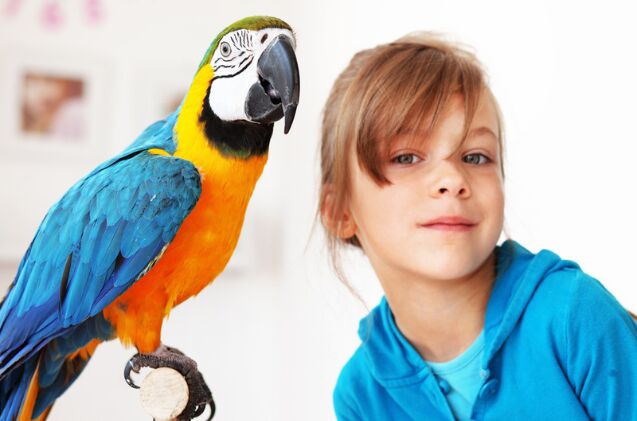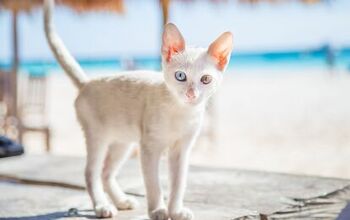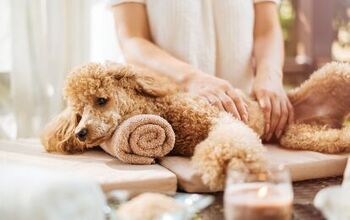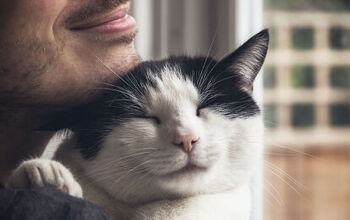Do Birds Make a Good Pet for Children?

Are you a bird lover and look forward to sharing that love with your child? Has your child recently been asking to add a bird to the family? If so, there are a few critical factors that you need to consider…
While a pet can be a great way to teach responsibility and respect for animals, not every pet is ideal for children – especially young children! At this early age, kids are still learning how to navigate the world around them. They are often loud and unpredictable, creating an uncomfortable situation for a new pet who doesn’t know or understand what to expect. This can lead to injuries to your child or your new pet.
This brings us back to the question of the day – Do birds make good pets for children? The answer isn’t as black and white as you may have hoped…
Do Pet Birds Cuddle?
One of the things we often love about spending time with a pet is the love and affection that they share. Most people think of cuddly cats and dogs when they think of snuggling up with a pet. But these furry companions aren’t the only pets that enjoy curling up with their people. In fact, some bird species thrive on physical affection.
But this isn’t true for all birds. If you’re looking for a cuddly bird, you will need to research the options available.
Parrots are well known for their affectionate personalities. When they bond with their person, they enjoy throwing their love by spending time with you, sleeping on you, preening you, and, of course, cuddling you. However, don’t overlook the significant commitment that comes with raising a parrot! The Scarlet Macaw, for example, often lives 50-75 years, but there are reports of Macaws living longer than 100 years. They also grow considerably larger than many pet birds, requiring more space for a proper habitat.
Other birds that are also known to be cuddly include:
- Lovebirds
- Canaries
- Cockatoos
- Cockatiels
- Conures
- Parakeets
- Doves
What Age is Best to Buy a Bird?
If you have your heart set on introducing your child to the joys of owning a bird, it’s time to consider what stage in life will be the best to take this step. For most children, waiting until your child is at least 6 to 8 years old is recommended. But there is no one guaranteed age when a child is ready. Instead, it will depend on your child and their level of maturity.
Birds are fragile and can be easily hurt if your child is rough holding or playing with them. Additionally, you want to consider whether your child is prepared to take on some of the responsibility of caring for their new pet unless you are ready to take on all that work yourself. For example, a bird’s cage should be cleaned at least once every 2-3 days, including the surrounding area.
What are the Best Birds for Children’s Pets?
For each bird expert you ask, you will get a different answer to this question. Why? This is because it is open to interpretation. Each species of bird is known for a set of personality traits. The Golden Conure is known for being playful, silly, friendly, and energetic. But this doesn’t mean that there are no Golden Conures that are a little quieter or more reserved. You need to take the time to meet the bird in question and find out about their individual quirks and personality traits.
Some breeds are recommended for children more frequently than others. This includes:
- Budgies
- Finches
- Lovebirds
- Cockatiels
- Doves
These birds are generally lower maintenance than larger birds and easier to care for. Many of them are also friendly, meaning they are more open to and accepting of the attention a child will want to give them.
7 Things to Consider Before Buying Birds for Children
Before committing to adding a bird to your family, here are a few questions you should ask yourself. This includes questions that relate specifically to introducing a bird to a family with children, as well as questions that should be asked before purchasing a bird in any situation.
Are There Other Pets in Your Home?
While some animals can coexist peacefully with birds, this isn’t always true. If you have a dog or cat that has never been introduced to a bird and has a high prey drive, introducing a bird could create a dangerous situation. Don’t forget that you are also considering adding a child to the mix – which increases the chances of small mistakes like a door left open or an unlatched cage, making it harder to keep these pets safely separated if needed.
Are You Prepared for a Commitment of This Length?
As we previously mentioned, relating to the Scarlet Macaw, some birds have very long lifespans. In a world where many people who adopt dogs or cats struggle to commit to 10-15 years, you are potentially making a commitment that could last the rest of your life and beyond. This means making allowances to provide for this feathered family at every stage of your life– when your child grows up, when they go to university, when they move out on their own, and when they start their own family. If you can’t promise to continue providing for them through all this, you should reconsider making the commitment.
Are You Prepared Financially to Care for a Bird?
There are many expenses associated with caring for a bird – a proper cage, the cost of food, veterinary costs (and birds require a specialized avian veterinarian), and more. A smaller bird, like a finch, will need a smaller habitat and eat less, but there are still costs to consider. If you are not at a point financially where you can address a costly veterinary bill in an emergency, it is recommended that you hold off for a later time.
Do You Have Space in Your Home for a Bird?
Take a moment to look at the size of cage recommended for the type of birds you are considering. Do you have space for that cage in your home or apartment? Some cages for larger birds are five or six feet wide. In addition to the large size of the cage, you should also consider the close proximity around it. This space tends to get dirty due to spilled birdseed and feather dust. Plus, some birds will reach their beak through the cage to grab onto anything they can reach.
If you want to purchase a larger bird like a Macaw, you may need an entire room (or a significant portion of a room) dedicated just to your bird.
Is There Any Chance That Your Child or Any Other Family Members Have Allergies?
While you may not know if your child is allergic to birds, some health concerns could be a red flag. Children who suffer from allergies to dust or dander, those with respiratory problems, and children with asthma are not a good match for bird ownership. A bird’s habitat is rarely dust-free due to the use of shavings, the presence of feather dust, and other considerations.
If you have someone in the home with a minor allergy but are looking for a way to make it work, or if you have purchased a bird and are trying to find a way to address the problem, consider purchasing an air purifier for the room where the bird is kept. This will help remove troublesome particles from the air, reducing the risk of irritating allergies but not eliminating the problem.
Are You Okay with Potentially Being Bitten by a Bird? How Will Your Child Handle That Situation?
Any animal you bring into your home is going to come with the risk of a bite or injury. These are still animals with animal instincts at the root of it all. If a pet is scared, nervous, or uncomfortable, they may draw on their instincts to protect themselves. This does not mean they are aggressive, but it is a real possibility.
While many species of bird can be trained, they are generally less biddable than a dog. Additionally, birds use their beaks to navigate the world around them in a way that may appear like a bite without meaning to cause harm. For example, they may use their beak to help them climb up your child’s shoulder. It will feel like a bite to your child, but the bird wasn’t trying to do any harm.
Some children will understand if this is explained to them, but if your child is too young or is likely to freak out, they may not be ready for a bird.
Is Your Child Ready for the Responsibility of Owning a Bird?
Many parents will add a pet to the family to teach responsibility to their child. This can be a great opportunity, but only if your child is ready. Take an honest look at your child right now and their maturity level. Will they step up and care for the bird? If not, are you okay with taking this over and having to do all the work? If not, it’s not fair to the bird.
Final Thoughts: Birds as Pets for Children
If you are considering purchasing a bird for your family, there is some critical information to consider regarding birds and children. This can be an excellent opportunity for your child to develop a love, understanding, and respect for our feathered friends. But it can also create a negative situation that is harmful to both your child and the bird. This is why we must be honest with ourselves and make the right choice for everyone involved.
Is your child old enough to respect and care for a bird? Are they mature enough to take on the responsibility and learn how to handle a bird safely? Are you prepared to step in and provide the necessary care for your bird if your child is unable to or unwilling?
If the answer to any of those questions is “No,” now is not the time to add a bird to the family.
But if your answers paint a picture of a responsible child ready to learn and care for a new feathered family member, congratulations! Children and birds can develop an incredible bond that will last for years to come and even into their adult lives, depending on the species you choose.

Britt Kascjak is a proud pet mom, sharing her heart (and her home) with her “pack” which includes her husband John, their 2 dogs – Indiana and Lucifer – and their 2 cats – Pippen and Jinx. She has been active in the animal rescue community for over 15 years, volunteering, fostering and advocating for organizations across Canada and the US. In her free time, she enjoys traveling around the country camping, hiking, and canoeing with her pets.
More by Britt

























